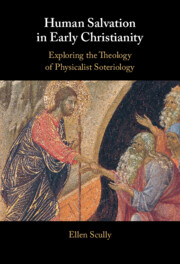Book contents
- Human Salvation in Early Christianity
- Reviews
- Human Salvation in Early Christianity
- Copyright page
- Contents
- Acknowledgments
- 1 The Rise and Fall of Early Christian Physicalist Soteriology
- 2 Scholarly Approaches to Physicalist Soteriology
- 3 Athanasius
- 4 Hilary of Poitiers
- 5 Marius Victorinus
- 6 Gregory of Nyssa
- 7 Cyril of Alexandria
- 8 Maximus the Confessor
- 9 The Almost, but Not Quite, Physicalists
- 10 Constructive Approaches to the Historical Reality of Physicalism
- Bibliography
- Index
3 - Athanasius
Pneumatological Physicalism
Published online by Cambridge University Press: 09 January 2025
- Human Salvation in Early Christianity
- Reviews
- Human Salvation in Early Christianity
- Copyright page
- Contents
- Acknowledgments
- 1 The Rise and Fall of Early Christian Physicalist Soteriology
- 2 Scholarly Approaches to Physicalist Soteriology
- 3 Athanasius
- 4 Hilary of Poitiers
- 5 Marius Victorinus
- 6 Gregory of Nyssa
- 7 Cyril of Alexandria
- 8 Maximus the Confessor
- 9 The Almost, but Not Quite, Physicalists
- 10 Constructive Approaches to the Historical Reality of Physicalism
- Bibliography
- Index
Summary
The recent denial of the presence of physicalist soteriology in Athanasius’ thought in favor of the “representative humanity” model is partially, but not entirely, correct. The passages and themes – particularly the incarnation as effecting a universal solution to the problem of death – that have historically been used as the “proofs” of Athanasius’ physicalism do not in fact reveal physicalist logic and are better explained through the “representative humanity” model. However, what neither the proponents of the “representative humanity” model nor those who have historically classified Athanasius as a physicalist recognize is that Athanasius’ physicalism is embedded in his pneumatology. Athanasius argues that deification is accomplished by the Holy Spirit; however, the Holy Spirit would not be able to deify individuals if the incarnation had not already transformed the human nature of all humanity in a way that makes humans newly capable of interiorly receiving and maintaining the presence of the Holy Spirit. Therefore, recognizing Athanasius’ physicalist logic is the prerequisite for understanding his presentation of deification by the Holy Spirit.
- Type
- Chapter
- Information
- Human Salvation in Early ChristianityExploring the Theology of Physicalist Soteriology, pp. 66 - 95Publisher: Cambridge University PressPrint publication year: 2025

